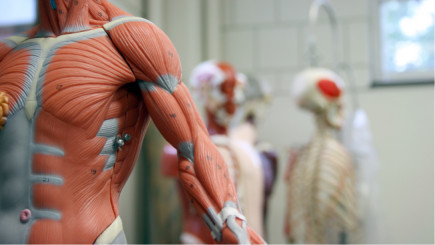
Learn human biology with online courses and programs
The biological sciences are the foundation of public health, psychology, epidemiology, and genomic sciences. If we can understand human biology, we can solve pressing challenges in health and build new models for care. Learn how with edX.

What is human biology?
Human biology is the study of the components and systems that facilitate various life processes. From the tiniest cells to the entire physiology of the human body, biology aims to understand how the body functions, develops, and reacts to its environment.
Biologists may choose to work across different bodily systems, whereas others may specialize in a particular subset of human biology, such as:
Genetics, the study of genes and how they impact human characteristics.
Anatomy, the study of the structure and arrangement of the human body.
Immunology, the study of the immune system and how it defends against disease.
Endocrinology, the study of hormone production and its effects on human functioning.
Neurobiology, the study of the nervous system, including its structure and mechanics.
Advancements and discoveries made through human biology studies can lead to important developments in medicine and disease prevention. If you want to learn more about how our bodies work, how diseases manifest, and how to improve your overall wellbeing, you can start to learn human biology with courses delivered through edX.
Browse online human biology courses
Related Topics
Human biology course curriculum
Human biology involves many different components and systems. Learners new to the topic may find it helpful to first learn about the individual elements that contribute to human life. These include:
- Cells, the building blocks of life, perform different functions across tissues, organs, and organ systems.
- Tissues, groups of cells that perform similar functions such as organ linings, connective tissue, muscle tissue, and nervous tissue.
- Organs, unique structures made from different tissues, such as the heart, lungs, brain, and kidneys.
- Organ systems, groups of organs that work together to perform a specific function necessary for survival, such as the circulatory and respiratory systems.
From there, you might move on to exploring subsets of human biology, including the studies of:
- Genetics, which studies genes and DNA and how they are passed along generations through heredity.
- Physiology, which studies the function and coordination between various bodily systems.
- Anatomy, which studies the structure of the human body, including organs, tissues, and systems.
- Immunology, which studies how the body’s immune system responds to disease through the production of antibodies and immune cells.
Start building the knowledge you need to work in the human biology field with edX. From accelerated boot camps to comprehensive programs that allow you to earn a bachelor’s degree or (for more advanced learners) a master’s degree, there are many different learning formats available to fit your needs. Busy professionals can even take advantage of executive education courses tailored to those in leadership and management positions. Find the right course for you.
Explore jobs in human biology
Knowledge of human biology is essential for many career paths. With proper skills and training, you may be able to pursue roles such as:
- Medical assistant: Aids physicians in various medical procedures, such as samples for biological testing.1
- Nutritionist: Evaluates clients’ nutritional needs and provides guidance around healthy eating habits.2
- Physician: Addresses patient concerns and health challenges through recommended resources, tests, and treatment plans.3
- Medical writer: Contributes written works on behalf of the medical field, such as newspaper articles, whitepapers, grant proposals, and other content.4
- Occupational therapist: Works with patients experiencing injuries, illnesses, or disabilities in their recovery and improvement of physical functions.5
While many of these roles exist within similar industries, employment qualifications for careers that may rely on human biology knowledge differ based on the position and employer. Some roles may require a higher level degree while others may only ask for a demonstration of skills that can be acquired through hands-on experience. Before deciding on which learning path will work best for you, research potential roles you hope to pursue and align your coursework with your professional aspirations.
More opportunities for you to learn
We've added 500+ learning opportunities to create one of the world's most comprehensive free-to-degree online learning platforms.
What Medical Assistants Do. (2022). U.S. Bureau of Labor Statistics. Retrieved July 10, 2023.
What Dietitians and Nutritionists Do. (2022). U.S. Bureau of Labor Statistics. Retrieved July 10, 2023.
What Physicians and Surgeons Do. (2022). U.S. Bureau of Labor Statistics. Retrieved July 10, 2023.
How To Become a Medical Writer in 6 Steps (plus Salary). (2022). Indeed. Retrieved July 10, 2023.
What Occupational Therapists Do. (2023). U.S. Bureau of Labor Statistics. Retrieved July 10, 2023.